Season four of Doctor Who, starring David Tennant as the Tenth Doctor and Catherine Tate as Donna Noble, marks a pivotal point in the revived series. Showrunner Russell T Davies masterfully crafts a season that is both consistently high in quality and deeply resonant in its themes, solidifying its place as a fan favorite and a critical high point. Following the emotional rollercoaster of previous seasons, season four sees the Tenth Doctor grapple with maturity and cynicism, finding an ideal counterpart in the outspoken and grounded Donna Noble. This season elevates the show beyond its earlier scrappier charm into a confident, well-oiled machine, delivering consistent quality right through to its final specials of the era. The dynamic between Tennant and Tate is truly exceptional, making this season a delightful and compelling watch. As anticipation builds for their upcoming reunion in the 60th anniversary specials, it’s the perfect time to revisit and rank each adventure from their original run, appreciating the nuances and brilliance of Doctor Who Season Four.
Lower Tier Episodes
14. “The Next Doctor” (2008 Christmas Special): Lost Potential in Victorian London
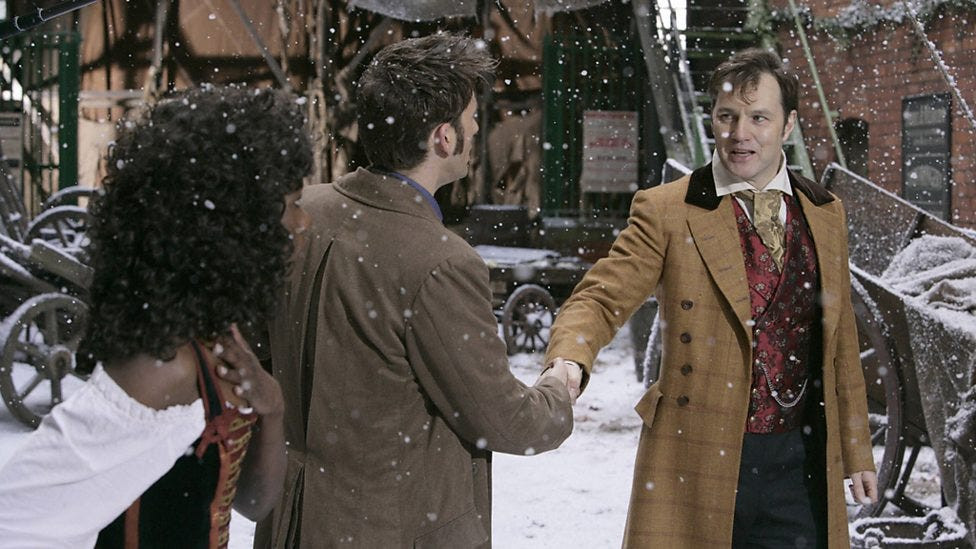 Jackson Lake proclaims himself the Doctor in Victorian London
Jackson Lake proclaims himself the Doctor in Victorian London
“The Next Doctor” presents a missed opportunity, burying a potentially poignant story under layers of CyberKing spectacle. The concept of Jackson Lake, a Victorian gentleman with amnesia believing himself to be the Doctor, held immense promise for a moving, character-driven narrative within a concise 42-minute format. However, the episode veers sharply into overblown territory with the introduction of the CyberKing, devolving from an intriguing Victorian mystery into a Kaiju-esque battle. The attempt to weave in a villainous plotline rooted in Victorian sexism further muddles the narrative, detracting from the initial charm. What began as a potentially captivating, low-key adventure in Victorian London unfortunately becomes lost amidst confusing plot points and excessive CGI.
13. “The Sontaran Stratagem” / “The Poison Sky” (Season Four, Episodes Four and Five): Underbaked Anti-War Parable
While even the lower-ranked episodes of season four remain watchable, “The Sontaran Stratagem” and “The Poison Sky” suffer from feeling stretched and underdeveloped. The return of Martha Jones, the modernization of UNIT, and the initial meeting between the Doctor and Wilfred Mott are notable highlights. The introduction of the Sontarans into NuWho also holds significance for long-term fans. However, these elements struggle to fully justify a two-part structure. The contemporary Earth setting, a recurring feature in the RTD era, lacks depth and imaginative writing in this instance. Furthermore, the inclusion of a stereotypical “American” character adds little value. Despite its anti-war message, the story feels more like an undercooked idea than a truly poorly executed one, ultimately landing in the lower tier due to pacing and setting limitations.
Solid Tier Episodes: Enjoyable Adventures with Minor Flaws
12. “Partners in Crime” (Season Four, Episode One): Character-Driven Comedy Premier
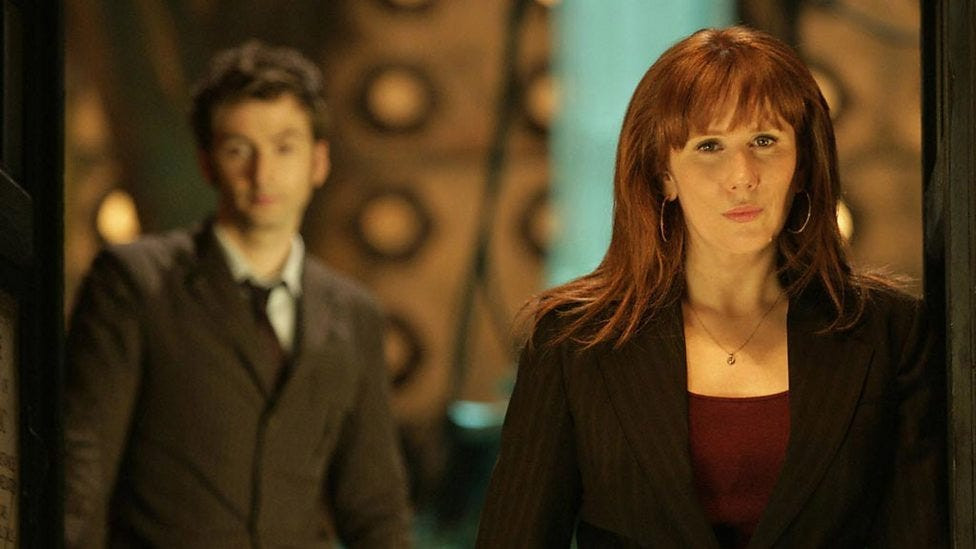 Donna Noble and the Doctor's comedic reunion in Partners in Crime
Donna Noble and the Doctor's comedic reunion in Partners in Crime
“Partners in Crime” successfully leverages the return of a beloved guest star, Donna Noble, as a full-time companion, injecting fresh energy into the season premiere. Although the Adipose storyline itself is somewhat weak and conceptually silly, the episode excels in its character-focused moments. The pantomime window cleaning scene stands out as a comedic highlight, along with the hilarious “want a mate/want to mate” exchange. Beyond the humor, the episode offers meaningful character development: the Doctor acknowledging his past mistakes with Martha, the endearing connection between Donna and Wilfred, and glimpses of Donna’s underlying melancholy beneath her comedic facade. The shocking cameo of Rose adds another layer of intrigue. It speaks volumes about the strength of season four that “Partners in Crime,” considered one of its weaker installments, still manages to kick off the season with such a memorable and entertaining bang.
11. “The Doctor’s Daughter” (Season Four, Episode Six): Family Ties and Moral Questions
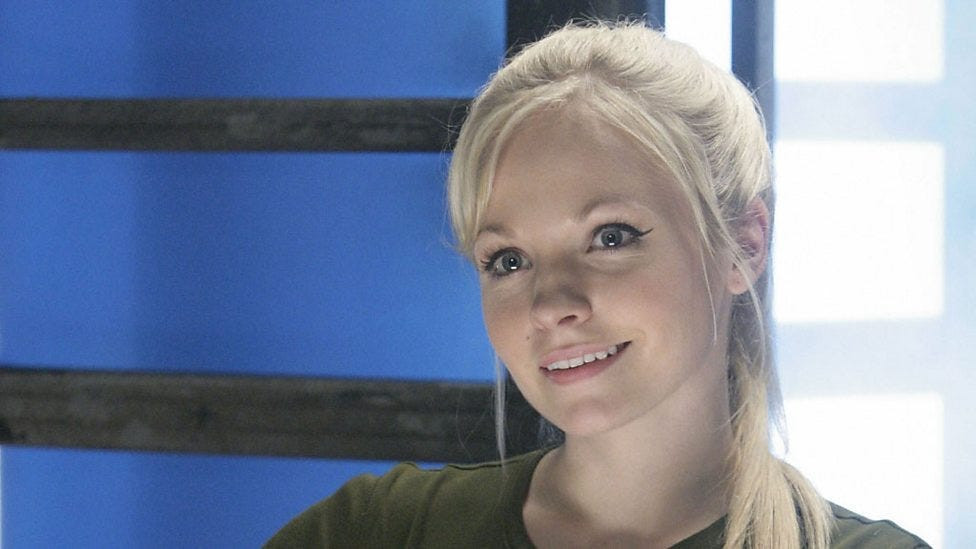 Jenny, the Doctor's Daughter, in a militarized setting
Jenny, the Doctor's Daughter, in a militarized setting
“The Doctor’s Daughter” holds a special place in Doctor Who lore, not just for its narrative but also for its off-screen impact – giving rise to the marriage of David Tennant and Georgia Moffett. Beyond this, the episode itself is a solid, if somewhat thematically heavy-handed, exploration of the Doctor’s character. The militarized dystopian setting, while a bit over-the-top, fits within the Doctor Who universe. Martha Jones arguably finds stronger material here than she often did as a full-time companion, and the episode raises interesting questions about the Doctor’s duality as both a soldier and a peacemaker. However, the uneven tone prevents it from reaching the upper echelons of the season’s best, settling comfortably in the solid tier.
10. “Planet of the Dead” (2009 Easter Special): Lighthearted Holiday Romp
“Planet of the Dead” often finds itself ranked lower in season four lists, but it offers a genuinely fun and lighter adventure. While admittedly silly and perhaps lacking in substantial depth, its lighter tone serves as a welcome contrast to the heavier episodes that define Tennant’s final run. The premise of a busload of people stranded on an alien planet and the introduction of memorable UNIT characters showcase RTD’s talent for creating instantly engaging ensembles. Michelle Ryan’s portrayal of Lady Christina de Souza injects a fun, vampy energy, perfectly suited for a one-off adventure, even if not ideal for a full-time companion. Similar to “Voyage of the Damned,” “Planet of the Dead” is best enjoyed as a heightened, entertaining holiday escapade.
9. “Planet of the Ood” (Season Four, Episode Three): Moral Quandaries and Social Commentary
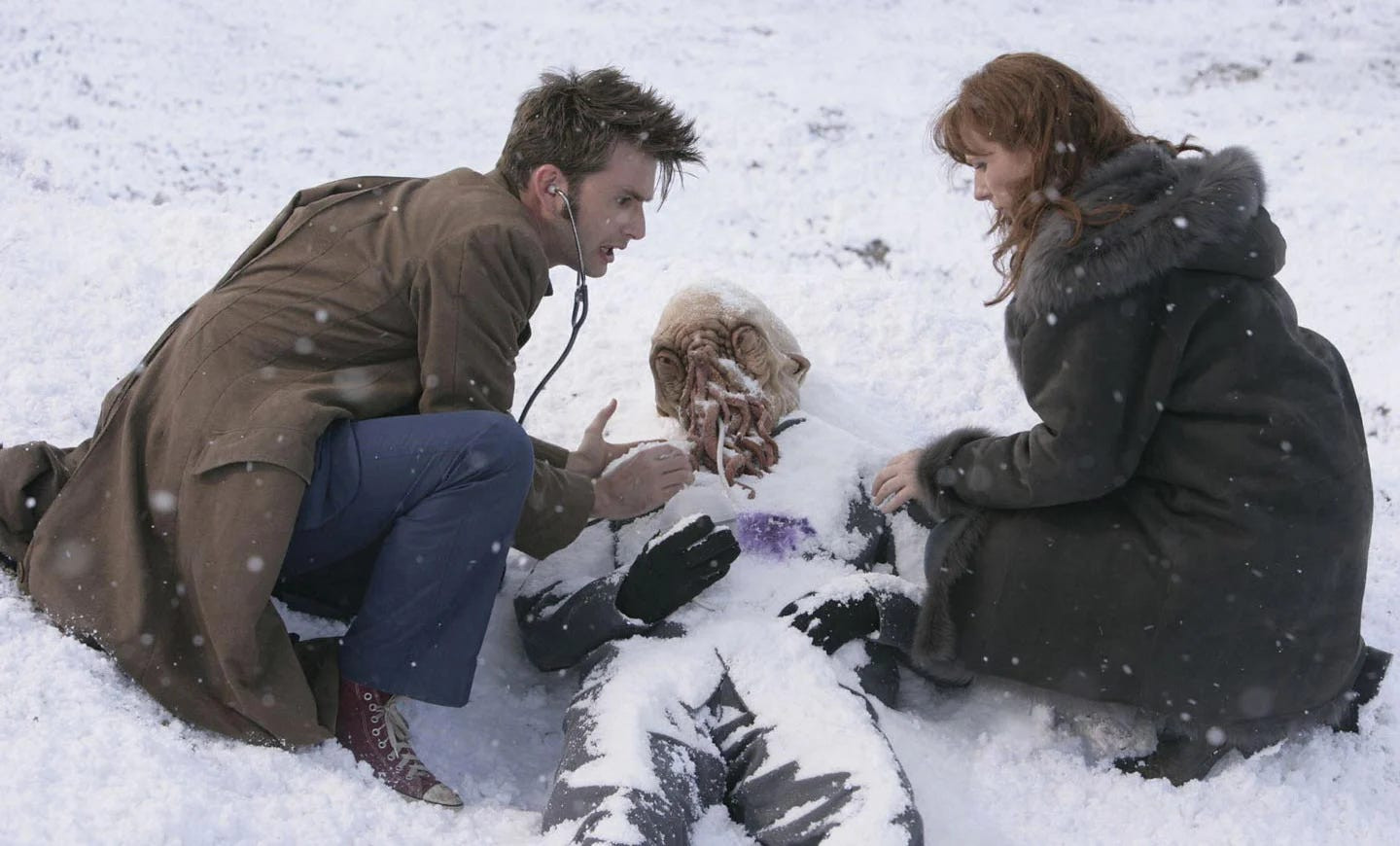 The Doctor and Donna observe the Ood in Planet of the Ood
The Doctor and Donna observe the Ood in Planet of the Ood
Shifting away from the interpersonal drama that defined the earlier NuWho seasons, season four delves into more abstract moral and ethical territories, reminiscent of Star Trek in its approach. “Planet of the Ood” exemplifies this shift, presenting a sci-fi parable that directly confronts the uncomfortable “happy slave” trope prevalent in fantasy and science fiction. While the Ood were initially introduced in season two, this episode places their plight center stage, as the Doctor and Donna uncover the disturbing reality behind their seemingly willing servitude. The episode offers a righteous, if somewhat simplistic, critique of modern-day capitalism and exploitation. The true emotional core lies in Donna’s character arc, as she evolves from feeling overwhelmed by the Ood’s alien nature to recognizing their inherent humanity, showcasing her growing compassion and understanding.
8. “The Stolen Earth” / “Journey’s End” (Season Four, Episodes Twelve and Thirteen): Ambitious Finale, Uneven Execution
Ranking the RTD grand finales against regular episodes is always challenging, and “The Stolen Earth” / “Journey’s End” presents a particularly complex case. It’s packed with moments to love, particularly in “The Stolen Earth” with its thrilling companion reunion, but also moments of frustration, mainly in “Journey’s End,” with its rushed and morally ambiguous resolution. The Avengers-style team-up of the Doctor’s allies to face the Dalek threat is undeniably exhilarating. However, the finale’s climax feels morally muddled and strangely anticlimactic. The Meta-Crisis Doctor concept, brimming with potential, is unfortunately rushed to a confusingly neat happy ending. Perhaps with a three-episode arc instead of two, RTD could have given the finale’s resolution the depth it deserved. With so many characters and storylines vying for attention, including Donna’s heartbreaking departure, individual moments lack room to breathe. Despite its flaws, the initial thrill of the companion team-up in “The Stolen Earth” is undeniably captivating and elevates it to the solid tier.
7. “The Unicorn and the Wasp” (Season Four, Episode Seven): Delightful Celebrity Historical Mystery
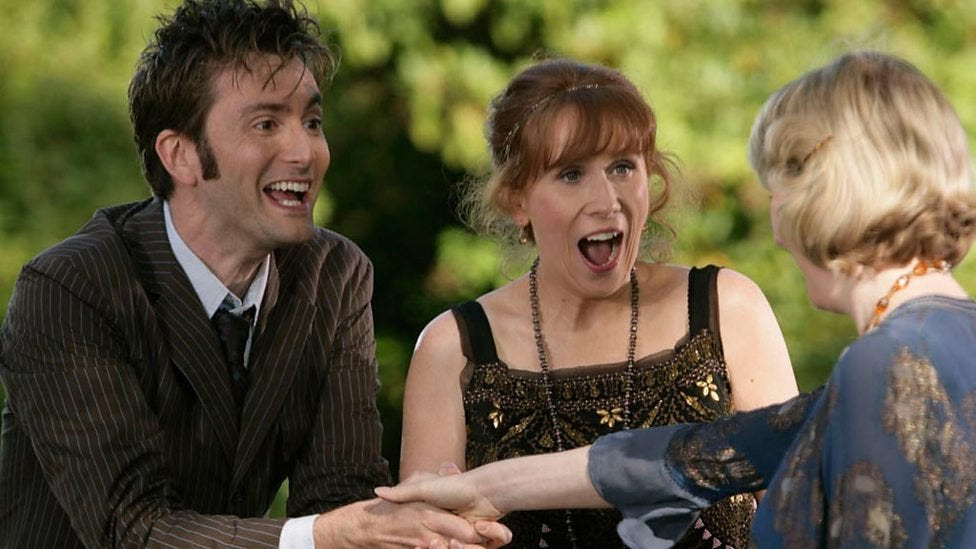 The Doctor and Donna investigate a mystery with Agatha Christie
The Doctor and Donna investigate a mystery with Agatha Christie
“The Unicorn and the Wasp” stands out as the most successful “celebrity historical” episode of the RTD era. Several factors contribute to its success: the BBC’s inherent strength in portraying early 20th-century settings, and the inherently intriguing premise of a murder mystery starring Agatha Christie, loosely based on real-life mysteries surrounding the author herself. The episode embraces comedic flair, offering a welcome lighter tone amidst the heavier, more somber overall arc of season four. Tennant and Tate are clearly enjoying themselves, adding to the episode’s charm. The only minor misstep is the somewhat unconvincing CGI bee, but this is easily forgiven in light of the hilarious kitchen charades scene and the episode’s overall delightful tone.
6. “The Fires of Pompeii” (Season Four, Episode Two): Morality and Historical Tragedy
“The Fires of Pompeii” is a remarkable achievement, delivered as early as the second episode of the season, demonstrating the show’s newfound confidence during RTD’s tenure. It’s astonishing that such a morally complex episode originates from the seemingly lighthearted premise of “Ancient Pompeii as a British family sitcom.” However, the initial goofiness gradually gives way to a harrowing exploration of the ethics of time travel, with consequences that ripple throughout the series, most notably with the casting of Peter Capaldi. This episode also marks a turning point in understanding Catherine Tate’s range, solidifying her not just as a comedic talent but also as a genuinely powerful dramatic actress, a crucial element for the emotional depth of the season as a whole.
5. “Turn Left” (Season Four, Episode Eleven): Eerie Alternate Reality and Precariousness of Life
 Rose Tyler and Donna Noble in an alternate reality in Turn Left
Rose Tyler and Donna Noble in an alternate reality in Turn Left
Aside from the problematic Orientalism that initiates the plot, “Turn Left” is a chillingly effective “what if” scenario, highlighting the fragility of our existence, particularly in a world without the Doctor’s constant intervention. The episode’s depiction of a thriving nation’s rapid descent into a fascist dystopia feels disturbingly plausible, with Wilfred’s haunting line, “It’s happening again,” adding to the unease. The dynamic between Rose and Donna is genuinely touching, with Rose acting as a Doctor-like figure to the more hesitant, alternate-universe version of Donna. Like many of season four’s strongest episodes, “Turn Left” serves as a powerful showcase for Tate’s acting abilities. It also functions as a thematically resonant prelude to the massive reunion and season finale, emphasizing the Doctor’s crucial role in the universe.
4. “The End of Time – Parts One and Two” (2009 Christmas Special / 2010 New Year’s Special): Melodrama and Emotional Send-off
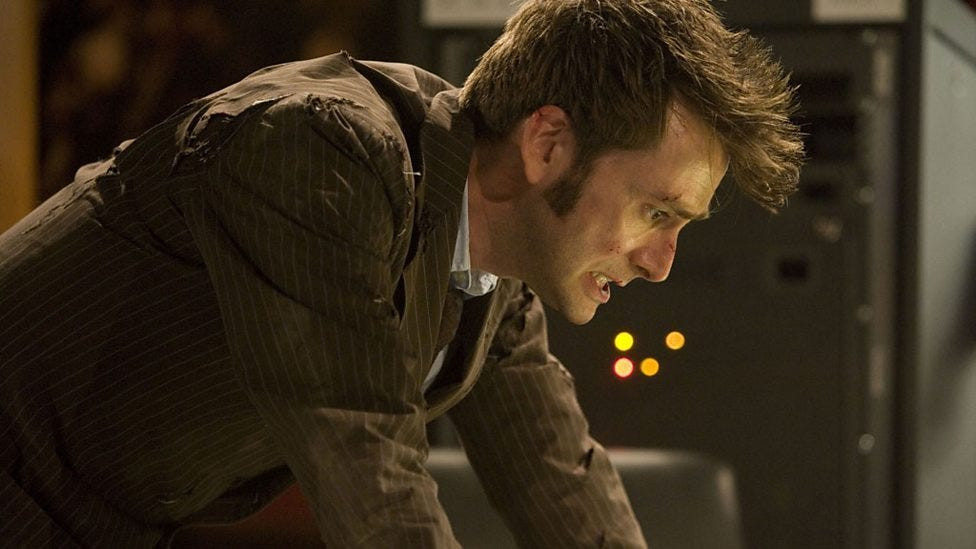 The Tenth Doctor and Wilfred Mott face the End of Time
The Tenth Doctor and Wilfred Mott face the End of Time
“The End of Time” perfectly encapsulates the RTD era’s blend of ludicrous plots and deeply affecting emotional moments. Serving as both a season finale and a send-off to an entire four-season arc, it’s another uneven two-parter, with the latter half significantly stronger than the first. However, the stronger half lands where it matters most, providing a powerful conclusion. While the Master’s return plotline is largely a misfire, with the exception of John Simm’s committed performance, the decision to position Wilfred Mott as the Tenth Doctor’s final companion proves to be a masterstroke. Ten, a Doctor defined by emotional repression, is profoundly affected by Wilf’s open-heartedness, allowing Tennant to explore previously unseen vulnerabilities. While the two-parter leans heavily into melodrama, it feels fitting for Ten’s character, a Doctor born from and defined by intense emotions. “The End of Time” honors this aspect of his character, providing Tennant with an emotionally resonant farewell worthy of his stellar tenure.
Top Tier Episodes: Season Four Masterpieces
3. “The Waters of Mars” (2009 Fall Special): Darker Doctor and the Burden of Power
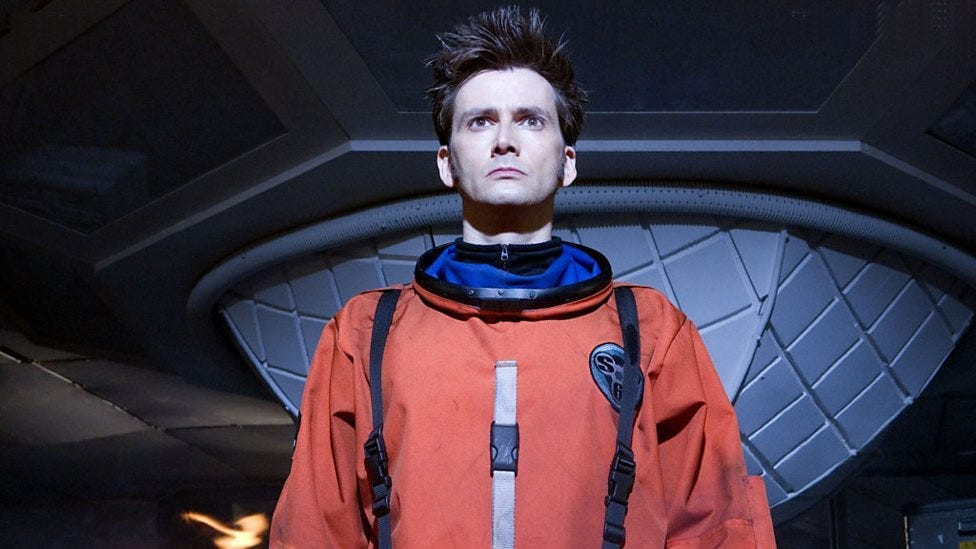 The Doctor confronts the Flood in The Waters of Mars
The Doctor confronts the Flood in The Waters of Mars
One of NuWho’s enduring strengths is the undercurrent of danger surrounding the Doctor – the sense that this immensely powerful being is perpetually on the verge of tipping from hero to something far more formidable. “The Waters of Mars” masterfully taps into this, placing the audience squarely in the Doctor’s mindset to illustrate the immense weight of his power and responsibility. In a typical episode, viewers would unequivocally root for the Doctor to bend the rules to save the brave scientists of Bowie Base One. However, “The Waters of Mars” forces us to confront the understanding that such an action would represent a transgression he could never undo. This subversive shift in perspective elevates a classic base-under-siege story into a truly unforgettable and chilling exploration of the Doctor’s psyche and the temptations of absolute power.
2. “Midnight” (Season Four, Episode Ten): Claustrophobic Terror and Human Nature’s Dark Side
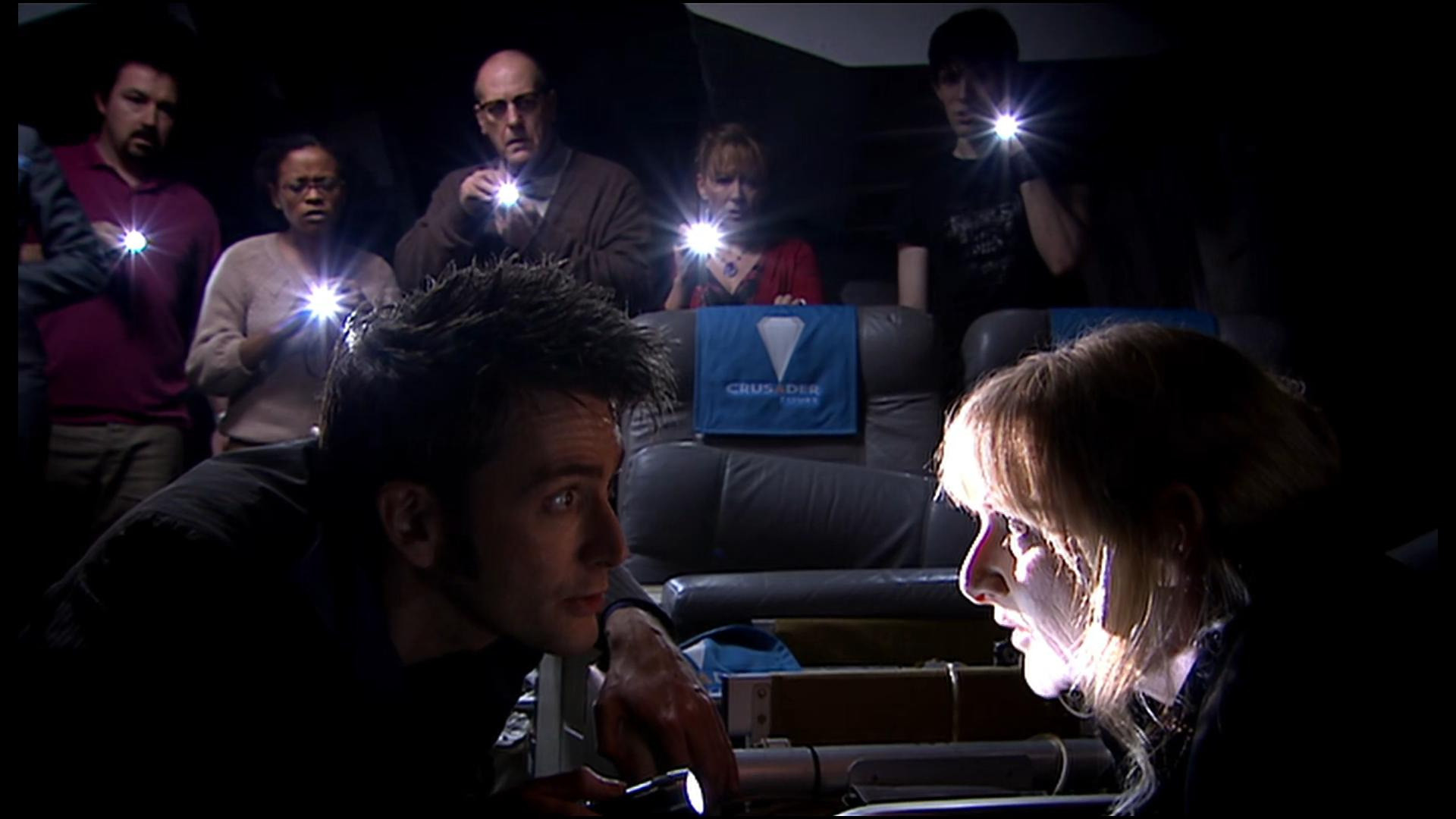 Passengers trapped in a claustrophobic setting in Midnight
Passengers trapped in a claustrophobic setting in Midnight
While RTD’s showrunning prowess typically shone in overarching character arcs and intimate character scenes, season four yielded some of his strongest individual episodes, including the masterpiece that is “Midnight.” Necessity became the mother of invention in this case. Practical constraints regarding budget and filming locations led to a contained setting, minimal special effects, and a companion-lite narrative. RTD brilliantly transformed these limitations into strengths, crafting a terrifying chamber piece that examines the Doctor’s character when stripped of his usual support system. After four seasons celebrating the resilience of the human spirit, “Midnight” offers a starkly contrasting perspective, acknowledging that in moments of crisis and paranoia, humanity can descend into monstrous behavior. The absence of catharsis in RTD’s narrative only amplifies the episode’s haunting and unsettling impact, making it a truly unforgettable and disturbing exploration of human nature.
1. “Silence in the Library” / “Forest of the Dead” (Season Four, Episodes Eight and Nine): A Masterclass in Sci-Fi Horror and Romance
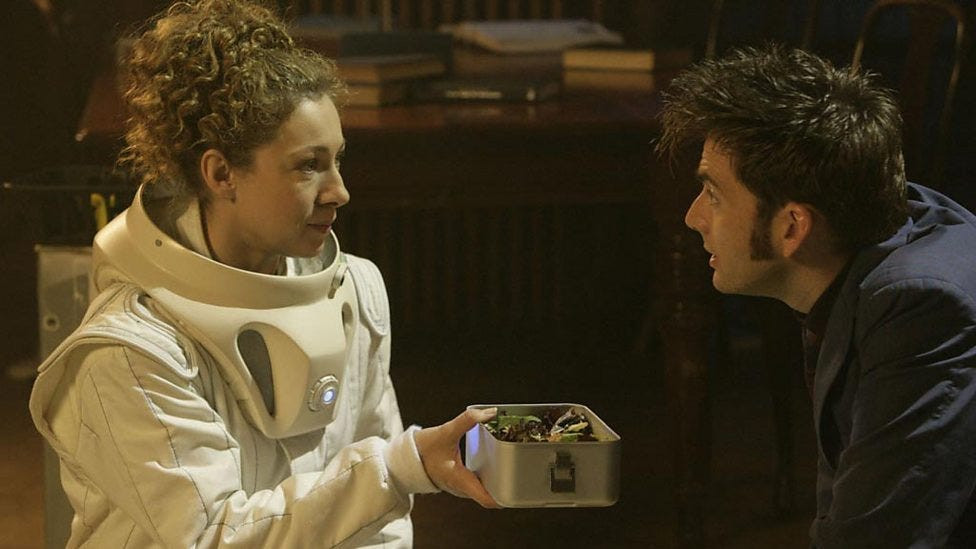 River Song and the Doctor in the Library in Silence in the Library
River Song and the Doctor in the Library in Silence in the Library
Despite ongoing fan debates about the best Doctor Who showrunner, a compelling argument can be made that the show reached its zenith during the collaborative period of Russell T Davies and Steven Moffat. “Silence in the Library” / “Forest of the Dead” stands as a testament to this creative partnership. Blending eerie sci-fi thriller elements with a poignant, doomed romance, this two-part story embodies the bold experimentation NuWho embraced by its fourth season. Confident in its audience’s willingness to engage with complex narratives, the episode seamlessly weaves together Donna’s abstract alternate-reality subplot and the introduction of the Doctor’s temporally disjointed love story with Alex Kingston’s Professor River Song. “Silence in the Library” / “Forest of the Dead” is inventive, adventurous, conceptually rich, and profoundly emotionally resonant. It is a unique and unparalleled achievement within the RTD era, solidifying its place as the pinnacle of Doctor Who Season Four and arguably the entire RTD run.
Explore Previous Seasons: Revisit the journey of the Ninth Doctor in our season one rankings, delve into the Tenth Doctor’s early days with season two, and witness his “Fuck Boy era” in season three.
Stay Tuned for More: For ongoing Doctor Who coverage, including reviews of the new specials featuring Tennant and Tate, follow Girl Culture’s updates on Episodic Medium.
